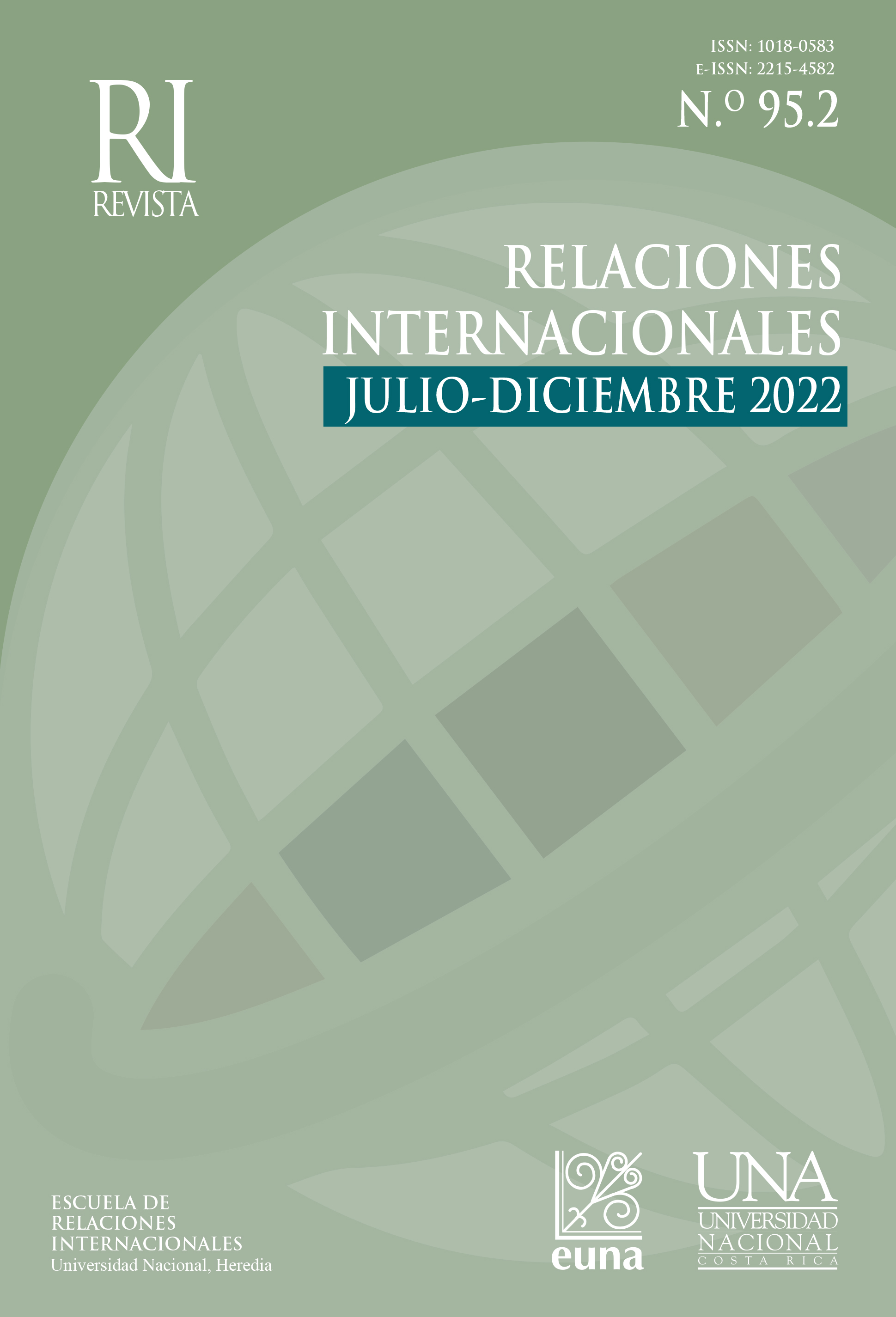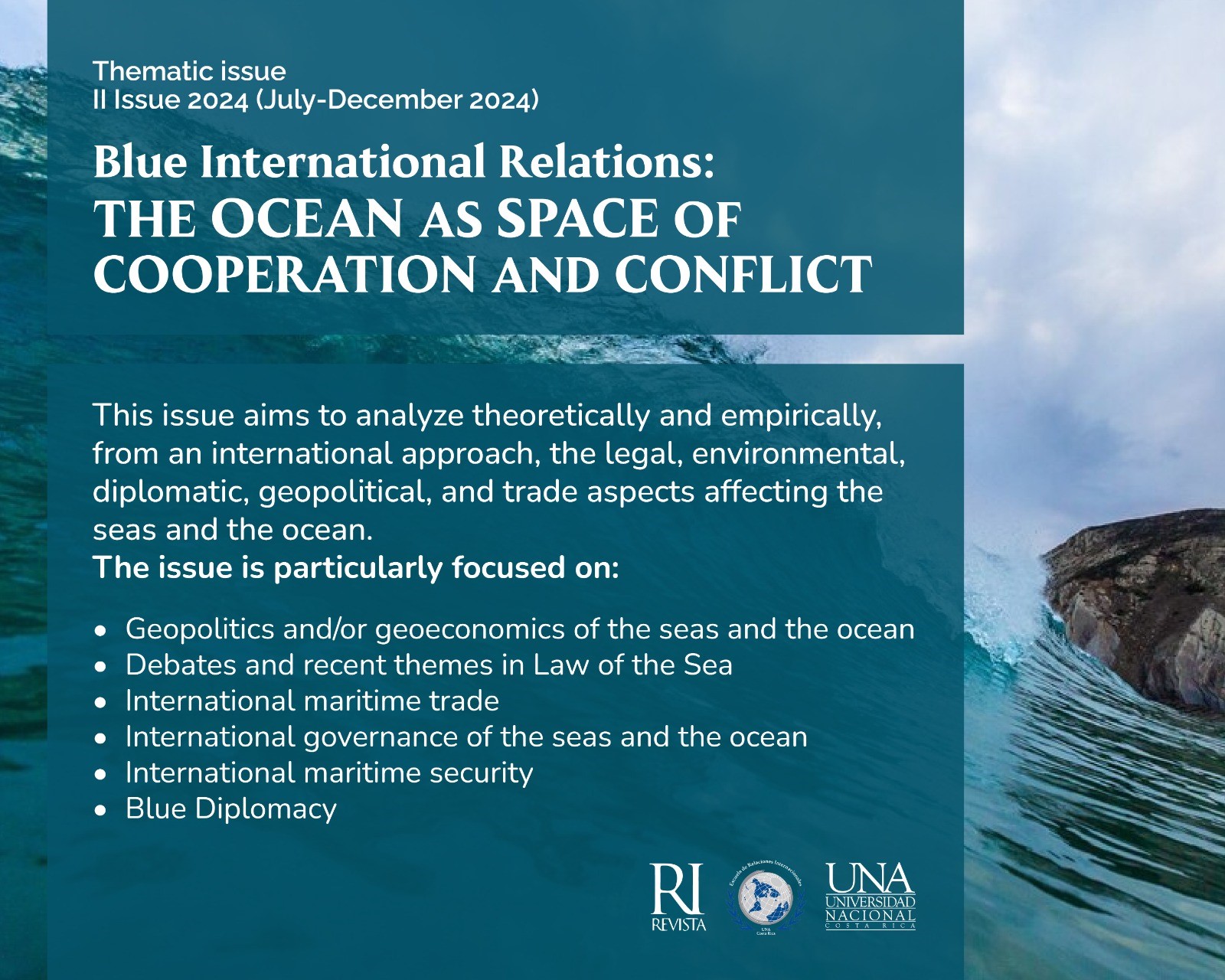Criminal Organizations and Hybrid Governance in South America: The COVID-19 scenario
DOI:
https://doi.org/10.15359/ri.95-2.5Keywords:
Brazil, Colombia, criminal organizations, hybrid governance, pandemic, South AmericaAbstract
This essay discusses how criminal organizations in South America have reconfigured themselves in the face of the pandemic scenario experienced since late 2019. In particular, it examines how the practices and actions carried out by these associations were carried forward in the pandemic, maintaining or even giving force the influence of crime on the life of South American society. It is argued that in order to understand criminal governance, it is essential to consider the discussion of how the territories in which these organizations operate are not in conflict with the state, but rather there is a hybrid governance in which criminal organizations and the state coexist as two sources of legitimacy. and authority. There is a complementarity of actions, in which criminal organizations were seen during the pandemic occupying state functions in the adoption of protective measures, and provision of assistance, but always with a clear objective of maintaining the status quo of their illicit activities. In the end, it is clear that criminal organizations have consolidated themselves as a governance space recognized as legitimate during the pandemic, complementing and, perhaps even, eclipsing the role of state bureaucracy in the face of the seriousness of the health emergency experienced, especially in the cases of Brazil and Colombia.
References
Albuquerque, A. L. (2021). Pandemia acentuou autoridade de criminosos onde o Estado é ausente, afirma professor, Folha de São Paulo, 4 de agosto de 2021. https://www1.folha.uol.com.br/mundo/2021/08/pandemia-acentuou-autoridade-de-criminosos-onde-o-estado-e-ausente-afirma-professor.shtml
Arjona, A. (2016). Institutions, Civilian Resistance and Wartime Social Order: A Process-Driven Natural Experiment in the Colombian Civil War. Latin American Politics and Society, 58(3): 99–122, 2016. DOI: 10.1111/j.1548-2456.2016.00320.x
Asmann, P. (2020). What Does Coronavirus Mean for Criminal Governance in Latin America? InSight Crime, 31 de março de 2020. https://insightcrime.org/news/analysis/criminal-governance-latin-america-coronavirus/
Berg, R., & Varsori, A. (2020). Covid-19 is increasing the power of Brazil’s criminal groups. LSE Latin America and Caribbean Blog. https://blogs.lse.ac.uk/latamcaribbean/2020/05/28/covid-19-is-increasing-the-powerof-brazils-criminal-groups/
Blattman, C., Cerero, D., Duncan, G., Hernández, S., Lessing, B., Martínez, J. F., Mesa-Mejía, J.P., Montoya, H. & Tobón, S. (2022). Crimen y Covid-19. Cómo los combos de Medellín respondieron a la pandemia. 243-264. In: Darwin Cortés Cortés & Christian Posso & Mauricio Villamizar-Villegas. Covid-19 consecuencias y desafíos en la economía colombiana. Una mirada desde las universidades, Univ. del Rosario, Banco de la Republica de Colombia.
Boege, V., Brown, A., Clements, K., & Nolan, A. (2008). On Hybrid Political Orders and Emerging States, 21. https://www.berghoffoundation.org/fileadmin/redaktion/Publications/Handbook/Articles/boege_etal_handbook.pdf
Bourdieu, P. (2018). Social Space and the Genesis of Appropriated Physical Space. International Journal of Urban and Regional Research, 46, 106-114.
Câncio, F. (2020). Quando o crime organizado se organiza para ajudar, amor não é certamente, Diário de Notícias (Portugal), 10 de abril de 2020. https://www.dn.pt/mundo/quando-o-crime-organizado-se-organiza-para-ajudar-amor-nao-e-certamente-12057918.html
Clunan A. & Trinkunas H. (2010). Conceptualizing Ungoverned Spaces: territorial statehood, contested authority, and softened sovereignty. In Anne Clunan and Harold Trinkunas (editors). Ungoverned Spaces: Alternatives to State Authority in an Era of Softened Sovereignty. Palo Alto : Stanford University Press;17–33.
Concha, V. F. Crimen organizado transnacional y el fortalecimiento del narcotráfico en pandemia. Escenarios Actuales, 59.
Diário do Litoral (2021). Traficantes proíbem bailes em favelas para conter o avanço da Covid nas comunidades. Diário do Litoral, 31 de março de 2021. https://www.diariodolitoral.com.br/brasil/traficantes-proibem-bailes-em-favelas-para-conter-o-avanco-da-covid/144277/
Díaz, F. D. (2021). Repercusiones del COVID-19 en el crimen organizado en América Latina. Anuario en Relaciones Internacionales del IRI, 2021.
Eisenhammer, S. (2020). Sem esperar ajuda do governo, Paraisópolis contrata médicos contra COVID-19, CNN Brasil, 02 de abril de 2020.
Ezrow, N. (2017). Global politics and violent non-state actors. Los Angeles: SAGE.
Feltran, G. (2018). Irmãos: Uma história do PCC. São Paulo: Companhia das Letras.
Ferreira, M. A. S. V. (2017). Estudos Críticos da Paz e Crime Organizado Transnacional. Revista Crítica de Ciências Sociais, 113, 29-50.
Ferreira, M. A., & Framento, R. S. (2019). Degradação da Paz no Norte do Brasil: O Conflito Entre Primeiro Comando da Capital (PCC) e Família do Norte (FDN). Revista Brasileira de Políticas Públicas e Internacionais, 4(2), 91-114.
Ferreira, M. A., & Gonçalves, A. B. (2022). Criminal governance and systems of parallel justice: practice and implications in Brazilian urban peripheries. International Journal of Law, Crime and Justice, 68, 100519.
Ferreira, M. A., & Richmond, O. P. (2021). Blockages to peace formation in Latin America: The role of criminal governance. Journal of Intervention and Statebuilding, 15(2), 161-180.
Ferreira, Marcos Alan S. V. (2019). “Brazilian criminal organizations as transnational violent non-state actors: a case study of the Primeiro Comando da Capital (PCC)”. Trends in Organized Crime, 22 (2): 148-165. 10.1007/s12117-018-9354-7
Global Initiative Against Transnational Organized Crime (2020). Crime and Contagion: The impact of a pandemic on organized crime. Policy Brief, March 2020.
Gomez, C.T. (2020), Organised Crime Governance in Times of Pandemic: The Impact of COVID-19 on Gangs and Drug Cartels in Colombia and Mexico. Bulletin of Latin American Research, 39: 12-15.
Hänggi, H. (2005). Promoting security sector governance. In: Heiner Hänggi and Fred Tanner (eds). Promoting Security Sector Governance in the EU’s Neighborhood, EUISS, 11-26.
Hauck, Pierre; Peterke, Sven (2010), Organized Crime and Violence in National and International Law, International Review of Red Cross, 92(878), junho.
Human Rights Watch (2020). Colombia: Armed Groups’ Brutal Covid-19 Measures. 15 de julho de 2021. https://www.hrw.org/news/2020/07/15/colombia-armed-groups-brutal-covid-19-measures
Iazzetta, M. (2020). Estado, crimen organizado y pandemia por Covid-19. Temas y Debates, (40), 289-294.
InSight Crime (2020). Criminal Governance Under Coronavirus: How Colombian Groups Seized the Day, InSight Crime 3 de setembro de 2020. https://insightcrime.org/news/analysis/criminal-governance-coronavirus-colombia/
Insper Conhecimento (2020). Veja ações de 7 países sul-americanos em resposta à Covid-19, Insper, 24 de julho de 2020. https://www.insper.edu.br/conhecimento/politicas-publicas/veja-acoes-de-7-paises-da-america-do-sul-em-resposta-a-covid-19/
Leitão, L. & Martins, M. A. (2020). Traficantes ameaçam comércio em favelas do Rio contra o aumento de preço do álcool gel. G1 Rio de Janeiro, March 26, 2020. https://g1.globo.com/rj/rio-de-janeiro/noticia/2020/03/26/traficantes-ameacam-comercio-em-favelas-do-rio-contra-o-aumento-de-preco-do-alcool-gel.ghtml
Lessing, B. (2020). Conceptualizing Criminal Governance. Perspectives on Politics, 1-20. doi:10.1017/S1537592720001243
Lilyblad, C.M. (2014). Illicit Authority and Its Competitors: The Constitution of Governance in Territories of Limited Statehood. Territory, Politics, Governance, 2(1), 72–93.
Lilyblad, C.M. (2020). Sovereignty and Illicit Social Order: Global Modernity, Local Agony. London: Routledge.
Lima, L. (2021). Ataques do Comando Vermelho deixam Manaus sitiada, Amazônia Real, 07 de junho de 2021. https://amazoniareal.com.br/manaus-sitiada/
Manso, B. & Dias, C.N. (2018). A Guerra: a ascensão do PCC e o mundo do crime no Brasil. São Paulo: Todavia.
Mejías, S. A. (2020). “Ni siquiera los traficantes de drogas pueden esconderse del coronavirus”: lecciones para la lucha contra el crimen organizado en América Latina. Análisis del Real Instituto Elcano (ARI), (87), 1.
Muniz, J. D. O., & Dias, C. N. (2022). Domínios armados e seus governos criminais: uma abordagem não fantasmagórica do “crime organizado”. Estudos Avançados, 36, 131-152.
Navarrete, M.A. (2020), Robo de implementos médicos crece en Latinoamérica por coronavirus”, InSight Crime, 22/IV/2020,
https://es.insightcrime.org/noticias/noticias-del-dia/robosimplementos-medicos-coronavirus/
Nobre, F. R. F., & Ferreira, D. do N. (2021). Atores não estatais violentos e instituições informais no Brasil (2008–2018). Revista Brasileira de Estudos de Defesa, 8(2).
Olson, M. (1993). Dictatorship, Democracy, and Development. The American Political Science Review, 87(3), 567-576.
ONU Organização das Nações Unidas (2000), United Nations Convention against Transnational Crime and the Protocols Thereto. Viena: UNODC.
Pearce, J. (2010). Perverse state formation and securitized democracy in Latin America. Democratization, 17(2), 286-306.
Pimenta, M.C.B.S., Suarez, M.A.G. & Ferreira, M.A. (2021). Hybrid governance as a dynamic hub for violent non-state actors: examining the case of Rio de Janeiro. Revista Brasileira de Política Internacional, 64(2), e007.
Podder, Sukanya (2017). Understanding the Legitimacy of Armed Groups: A Relational Perspective. Small Wars & Insurgencies, 28:4-5, 686-708, DOI:10.1080/09592318.2017.1322333.
Rodrigues, T., Pimenta, M., Miranda, W. M., & Quirino, J. (2021). Gobernanza híbrida, violencia urbana y legitimidad en tiempos de pandemia: el caso del Comando Vermelho en el Complexo do Salgueiro, de Río de Janeiro, Brasil. Análisis Político, 34(102), 123-149.
Rosenau, J. (1990). Turbulence in World Politics: A Theory of Change and Continuity. Princeton, New Jersey: Princeton University Press.
Rosenau, J. (2004). Strong demand, huge supply: Governance in an emerging epoch. In: I. Bache and M. Flinders, Multi-level governance, 31–48.
Sampaio, A. (2021). Criminal Governance During the Pandemic: A comparative study of five cities. Geneva: Global Initiative Against Transnational Organized Crime.
Santos, V. M. da S. (2021). Espaços desgovernados? Presença militar como combate ao crime na América Latina. Revista Brasileira de Estudos de Defesa, 8(2).
Schlichte, K. & Schneckener, U. (2015). Armed Groups and the Politics of Legitimacy. Civil Wars, 17(4): 409–424.
Schuberth, M. (2016). Beyond Gang Truces and Mano Dura Policies: Towards Substitutive Security Governance in Latin America. Stability: International Journal of Security and Development 5(1): 1-20. DOI: 10.5334/sta.450
Tilly, C. (1985). War Making and State Making as Organized Crime, In: edited by Peter Evans, Dietrich Rueschemeyer, and Theda Skocpol Bringing the State Back In. Cambridge: Cambridge University Press, 169–87.
Villa, R., De Macedo Braga, C., & Ferreira, M. (2021). Violent Nonstate Actors and the Emergence of Hybrid Governance in South America. Latin American Research Review, 56(1), 36-49. https://larrlasa.org/articles/10.25222/larr.756/
Williams, P. (2008). Violent non-state actors and national and international security. International Relations and Security Network. https://www.files.ethz.ch/isn/93880/VNSAs.pdf
Willis, G. (2015). The Killing Consensus: Police, Organized Crime, and the Regulation of Life and Death in Urban Brazil. Oakland, California: University of California Press.
Zizumbo-Colunga, D. (2019). Confronting Crime by Ourselves: Trust in Neighbors, Trust in Authorities, and Anti-Crime Organization, Latin American Research Review, 54(3), 574–590.
Downloads
Published
How to Cite
Issue
Section
License

Revista de Relaciones Internacionales por Universidad Nacional de Costa Rica está bajo una Licencia Creative Commons Atribución-NoComercial-SinDerivar 4.0 Internacional








1.png)







3.png)
